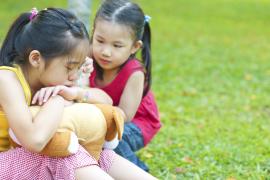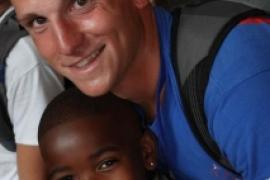School had never been a successful place for 13-year-old Manuel. He never felt smart enough or capable enough or emotionally safe enough to do well in school. For one thing, the "neck up" learning style of public school never fit his naturally active, learn-by-doing approach to life. Things got worse after his father was arrested for a minor drug charge that carried a mandatory one-year jail sentence. As a result, his father lost his job and his family became homeless. The stress and pressure made Manuel angry, a feeling he often expressed to his teachers, which landed him in the assistant principal's office on more than one occasion. As a way of helping Manuel regain his self-control, the assistant principal would let Manuel play with LEGOs in his office until he calmed down and was ready to go back to class. So it was with some hesitation that Manuel went off to Boston Explorers, an urban day camp for kids that was started by the same assistant principal, Alphonse Litz, later that year (Camping Magazine, 2014).
Manuel came to camp on an agreement that clearly spelled out what was expected of him and what consequences there might be if he couldn't control himself. When the camp director sat with Manuel and his mother to sign him up for camp, he made it clear that he thought Manuel was a great and talented kid. He believed Manuel could rise to the occasion and show everyone he could truly be successful in a place that allowed kids to make their own choices and encouraged them to take healthy risks. No one in school ever spoke to Manuel in such a positive and encouraging way. It made a big impression on him and his mother.
The first day Manuel came to camp, during the morning "choice time," he noticed the camp had a large assortment of LEGOs. He asked if he could play with them until the opening morning meeting. When he began building, Manuel commented that if he would have played with LEGOs at school in front of the other kids they would have ridiculed him mercilessly. Yet, here at camp everyone was interested and supportive. So what do you think Manuel built with his LEGOs? Houses, of course (his way of dealing with his family's homelessness). He was never a discipline problem at camp. On the contrary, at camp he became a leader.
The Brain Science Perspective
If you work with teens you are probably aware that brain science, which has been greatly enhanced by our ability to look directly at the brain with the help of various imaging technology (PET scans and fMRIs, to name two), has increasingly been shaping the way we think about adolescent development. We know, for example, that the brain develops from the bottom up and from back to front. What this means is that our so-called "reptile brain," which includes the amygdala — the brain circuit for processing fear — develops way ahead of the prefrontal cortex, the seat of reasoning and executive control. The result is that adolescents have a brain that is wired with an enhanced capacity for fear and anxiety but is relatively underdeveloped when it comes to calm reasoning (Ratey, 2001; Friedman, 2014).
It also means that the "top down" control that our frontal cortex exerts over our impulses and fears is far less robust in teenagers than it is in adults. In fact, the orbital frontal cortex (OFC) — the part of the brain that sits directly behind the eyes and is responsible for such things as understanding the emotional consequences of our actions and for judgment — is the last part of the brain to develop fully. In women it tends to be "finished" by age 22 and in men by age 25 (Ratey, 2001). Not great news for camp directors who entrust the responsibility for the care and wellbeing to their 18 to 22-year-old staff members!
One could easily see how the way Manuel reacted to the pressures in his life — his father in jail, his family homeless, and his pervasive sense of inadequacy in school — could be understood through the lens of adolescent brain science. Given the lack of development of his frontal cortex, typical for kids his age, one might be less surprised that Manuel could barely contain himself in school. His brain just wasn't wired up yet in a way that he could exercise better self-control. This point of view is eloquently articulated by Richard Friedman, the psychiatrist known for his frequent contributions to the New York Times on various aspects of the mind and brain, in his article, "Why Teenagers Act Crazy" (Friedman, 2014). Dr. Friedman suggests that the rise in anxiety and depression in adolescents is direct ly correlated to the fact that the frontal cortex in adolescents is not well developed and therefore doesn't permit the kind of topdown control we expect to see in adults.
A Different Perspective
Some people have a dif ferent way of thinking, however. Robert Epstein, the author of the popular book, Teen 2.0, is one of them. He suggests the following: In more than 100 cultures around the world, teenage turmoil is absent. Such cultures don't even have a word for adolescence. If the teenage brain were responsible for the turmoil of our teenagers, we would see it everywhere. We don't.
The turmoil of our teenagers is due entirely to the societal practices that infantilize young people and isolate them from responsible adults, trapping them in the frivolous, media-controlled world of "teen culture." Anthropological research also demonstrates that when Western schooling and media enter cultures where teenagers are highly functional, they typically take on all the pathological characteristics of American teenagers within a decade. The problem is our society, not the brain (Epstein, 2014).
Indeed, Manuel, who was constantly in the assistant principal's office in school, performed beautifully at camp. Could it be that there are elements of a strong, positive camp experience that trump brain development? How else to explain that not all adolescents exhibit the tremendous anxiety and disorder that we see in many teens in the United States; or that Manuel, given the support and encouragement he received at camp, could show up as a very different young man?
Another person who has a different perspect ive is popular author El len Galinsky. Dr. Galinsky, who has studied children and teens for many years, suggests that the adolescent brain is also hard-wired for social interaction and for bonding with caregivers. Teens, she states, are hungry for significant relationships with adults who care about them. She interviewed more than a thousand children that led her to write her book, Mind in the Making: The Seven Essential Life Skills Every Child Needs (2010). She found that teens long for more time with their parents, even when they seem to be pushing them away! Or to put it the way Deborah Meier, author, educator, and school founder, once said to me in a private conversation at the Mission Hill School where she was principal at the time, "We need to put adolescents in the presence of caring and interesting adults who give them a sense of value, purpose, and hope (Meier, 2006)." This is exactly what happened to Manuel at camp. He found a camp director and several young adult counselors who truly took an interest in him and supported his curiosity, creativity, and his healthy choices.
What Camp Can Offer Teenagers
Other factors that camp brings into play also have a profound impact on the level of anxiety, depression, and self-control adolescents exhibit. Let's start with what camp keeps teenagers from — technology! From my conversations with camper parents, it is clear many of them see an advantage that camp gives their children, which is a brief respite from technology and social media. Indeed, many of my teenage patients and teens I have spoken with at camps around the country tell me that social media is a blessing and a curse. They love the fact that they can be in touch with so many of their friends no matter where they are. But they admit that social media creates anxiety in many ways. There is the constant fear of some picture or snarky remark showing up on all of their friends' mobile phones from an enemy out to embarrass them. Or the pressure to keep up with all the kids whose social media image seems so perfect and idyllic compared to theirs.
Then there are the benefits of a solid, positive camp program, especially if that program challenges teenagers to go outside their comfort zones, but with support, guidance, and safety. So many adolescents I speak with complain about a lack of meaningful experiences in their lives. Camp programming that challenges teens or offers ways to take true responsibility, such as in a counselorin- training (CIT) or leader-in-training (LIT) program, are tremendous antidotes to what Dr. Epstein calls "the frivolous, media-controlled world of 'teen culture'" (Epstein, 2014). And camp programs that give teens an opportunity to give back by performing a service for others can be equally as powerful.
Yet, for me, the defining ingredient in a positive camp experience for teens is the culture at camp. Camps that cultivate respect and genuine support in the way the adults interact with their campers can be the most powerful element in a child's camp experience. For example, when camps give permission for campers to show their vulnerable side and come to understand that vulnerability is not the same as weakness — and that without it there is no true growth or creativity — they are providing a life lesson that is truly priceless. When the counselors and other adults encourage kids to try new things they might never try at home in an environment of support and acceptance, then failure becomes an accepted part of learning rather than a source of shame.
Or as the campers at Boston Explorers will tell you, there are "four things we do every day: We work with our hands; we explore Boston; we are kind to everyone; and we have fun!" When the adults at camp live their culture, as we do at Boston Explorers, those four things become a way of life and not just a slogan. A strong, positive camp culture is the true "medicine" for the adolescent brain: meaningful, authentic connection with caring adults; an opportunity to take healthy risks and master new skills ; and the chance to develop one's emerging sense of self.
References
Camping Magazine (2014, January/February). Lessons from an urban day camp: Program features that help children thrive. Retrieved from www.ACAcamps.org/campmag/1401/ lessons-urban-day-camp
Epstein, R. (2010). Teen 2.0: Saving our children and families from the torment of adolescence. Fresno, CA: Quill Driver Books.
Epstein, R. (2014, July 6). [Letter to the editor]. The New York Times Sunday Review.
Friedman, R. (2014, June 9). Why teenagers act crazy. The New York Times Sunday Review.
Galinsky, E. (2010). Mind in the making: The seven essential life skills every child needs. New York, NY: Harper Collins.
Meier, D. (2006) Private conversation at the Mission Hill School.
Ratey, J.J. (2001). A user's guide to the brain. New York, NY: Random House.
Bob Ditter is a licensed clinical social worker specializing in child, adolescent, and family therapy.



